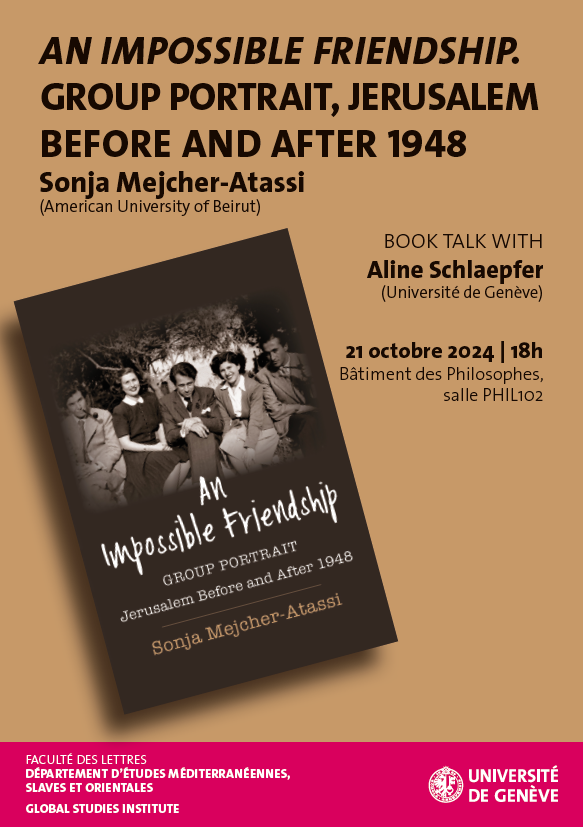
Sonja Mejcher-Atassi is a professor of Arabic and comparative literature at the American University of Beirut. She is the author of Reading Across Modern Arabic Literature and Art (2012), as well as coeditor of The Theatre of Sa’dallah Wannous: A Critical Study of the Syrian Playwright and Public Intellectual (2021), Rafa Nasiri: Artist Books (2016), and Archives, Museums, and Collecting Practices in the Modern Arab World (2012).
More info here.
There will be a book talk at the University of Zurich on 22 October 2024, too. Check all the informations here.
BOOK TALK
An Impossible Friendship: Group Portrait, Jerusalem Before and After 1948
Sonja Mejcher-Atassi (American University of Beirut) with Aline Schlaepfer (University of Geneva
21 October 2024, 18h Bâtiment des Philosophes, salle PHIL102
In Jerusalem, as World War II was coming to an end, an extraordinary circle of friends began to meet at the bar of the King David Hotel. This group of aspiring artists, writers, and intellectuals—among them Wolfgang Hildesheimer, Jabra Ibrahim Jabra, Sally Kassab, Walid Khalidi, and Rasha Salam, some of whom would go on to become acclaimed authors, scholars, and critics—came together across religious lines in a fleeting moment of possibility within a troubled history. What brought these Muslim, Jewish, and Christian friends together, and what became of them in the aftermath of 1948, the year of the creation of the State of Israel and the Palestinian Nakba?
Sonja Mejcher-Atassi tells the story of this unlikely friendship and in so doing offers an intimate cultural and social history of Palestine in the critical postwar period. She vividly reconstructs the vanished social world of these protagonists, tracing the connections between the specificity of individual lives and the larger contexts in which they are embedded. In exploring this ecumenical friendship and its artistic, literary, and intellectual legacies, Mejcher-Atassi demonstrates how social biography can provide a picture of the past that is at once more inclusive and more personal. This group portrait, she argues, allows us to glimpse alternative possibilities that exist within and alongside the fraught history of Israel/Palestine. Bringing a remarkable era to life through archival research and nuanced interdisciplinary scholarship, An Impossible Friendship unearths prospects for historical reconciliation, solidarity, and justice.
